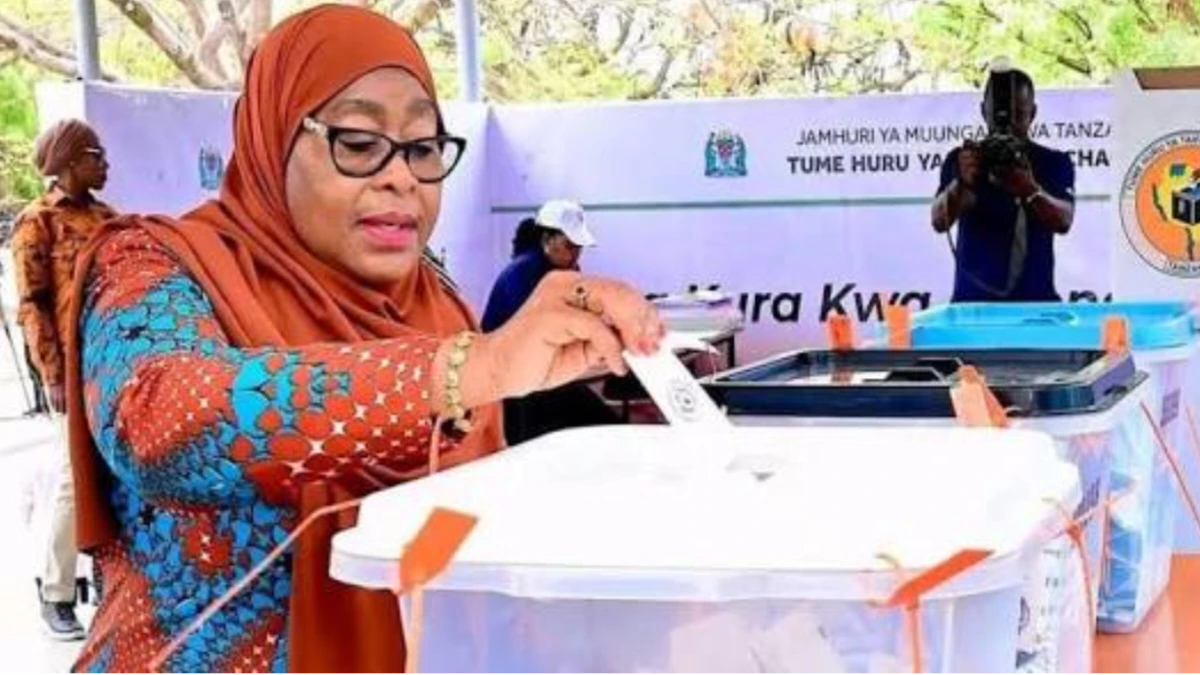DODOMA, Tanzania — President Samia Suluhu Hassan was declared the landslide winner of Tanzania’s general election on Saturday, securing a second five year term after a vote marred by violence, internet shutdowns, and allegations of voter suppression.
The National Electoral Commission said Hassan won with 97.66 percent of more than 31.9 million ballots cast, in a contest that saw her two main challengers disqualified before polls opened.
Her victory sparked unrest across several regions as security forces clamped down on demonstrations that rights groups said left at least ten people dead.
Hassan, 64, became Tanzania’s first female president in 2021 after the death of her predecessor, John Magufuli. She initially pledged to restore democratic freedoms and rebuild international ties strained during Magufuli’s rule.
However, this week’s election has drawn sharp criticism from opposition parties and human rights advocates who accused authorities of silencing dissent.
The main opposition party, the Party for Democracy and Progress (CHADEMA), was barred from participating after refusing to sign a government-imposed code of conduct. Its leader, Freeman Mbowe, remains in custody on treason charges.
Demonstrations erupted in Dar es Salaam, Arusha, and Mwanza following the vote, with protesters tearing down campaign posters and clashing with police.
Witnesses reported gunfire and tear gas as authorities sought to disperse crowds. “They came out demanding a fair election, but what they got was bullets and fear,” said a Dar es Salaam resident, who asked not to be named due to safety concerns.
Political analysts say the scale of Hassan’s victory more than 97 percent of the vote raises questions about the fairness of the electoral process in a nation once viewed as a stable democracy in East Africa.
“The margin suggests a severely uneven playing field,” said Dr. Albert Nyerere, a political scientist at the University of Dar es Salaam.
“While the ruling Chama Cha Mapinduzi (CCM) has deep roots in Tanzanian politics, excluding challengers effectively turned this into a one-party contest.”
International observers expressed concern over the transparency of the vote. The African Union mission noted “limited access to polling stations for monitors” and “inconsistent communication from the electoral commission.”
“This election was an opportunity for President Hassan to reinforce her reformist image,” said Anna Mbogo, a Nairobi based regional analyst with the East African Policy Institute. “Instead, it risks cementing her association with repression and eroded trust in democratic institutions.”
According to official figures, voter turnout stood at 68 percent, down from 85 percent in the 2020 general election. Human rights organizations reported more than 400 arrests in the days surrounding the vote, including journalists, activists, and opposition supporters.
The government has denied claims of mass killings, calling them “grossly exaggerated.” Still, the United Nations human rights office confirmed at least ten fatalities in three major cities.
Internet monitoring groups, including NetBlocks, reported nationwide disruptions to social media platforms beginning Wednesday morning, coinciding with the start of protests.
The curfew and travel restrictions imposed since then have led to widespread cancellations of domestic and international flights, disrupting operations at Dar es Salaam’s port a key gateway for trade in East and Central Africa.
In Dodoma, residents expressed mixed feelings about the election outcome. Supporters of the ruling party celebrated in the streets, waving flags and chanting “Mama Samia,” a nickname for the president.
“This victory means peace and continuity,” said Paul Mtebe, a CCM supporter. “She has brought stability and development. The protests are just noise from those who lost.”
Others, however, voiced frustration and fear. “We wanted change, but our voices were silenced before we could even vote,” said a 28 year old teacher from Mwanza, who declined to give her name. “Now we live under curfew, and people are disappearing.”
Local journalists reported that several news outlets were warned by authorities against “publishing inflammatory content.” Independent radio stations in Arusha and Zanzibar were temporarily taken off air.
With her new mandate secured, Hassan faces mounting pressure both domestically and abroad to restore calm and reopen political space.
The European Union and the United States have called for restraint and a transparent investigation into reports of violence and detentions.
Analysts warn that economic repercussions could follow if instability persists. Tanzania’s port disruptions threaten regional trade routes used by landlocked neighbors such as Rwanda and Zambia. Tourism operators also fear cancellations as travel advisories expand.
“Hassan’s challenge now is not just to govern, but to rebuild legitimacy,” said Mbogo. “She must balance security concerns with the democratic principles she once championed.”
As Tanzania enters a new political chapter, the contrast between the government’s message of stability and the opposition’s cries of repression remains stark.
President Hassan’s emphatic victory consolidates her control but deepens questions about the future of democracy in one of Africa’s most pivotal nations.
For now, curfews, silence, and uncertainty hang over the country’s cities a reminder that Tanzania’s path forward may depend less on electoral numbers than on rebuilding trust between its leaders and its people.
